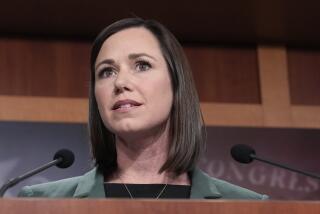Volunteerism: Is It, as the President Says, the True Spirit of America?
- Share via
In a participatory democracy, citizens must make the crucial difference. Citizen action on a much broader scale will be critical to overcoming the massive problems facing poor children and youth, who are the focus of the Presidents’ Summit for America’s Future. Summit planners persuaded me that citizen action would be portrayed as the crucial companion to, and not the private substitute for, vital government responsibilities, and that this event is just the kickoff for a sustained effort.
So despite my reservations, I became a cochair of the summit’s task force of faith communities. The participation of this constituency is critical to delivery of resources that are crucial and lacking in the lives of as many as 15 million of our young people, because we have been widely named as the heir apparent of the federal safety net.
Talk to any of the church-based service providers who work with poor people and you hear the same fear in their voices. They can all feel the storm coming. The International Union of Gospel Missions reported this past Thanksgiving a 60% increase in the number of new homeless people visiting their shelters and soup kitchens. Single adults looking for work (including many middle-aged women) have already begun to lose their food stamps. Elderly and disabled immigrants who soon will lose their benefit checks are quietly telling Catholic Charities caseworkers that suicide might be their best solution. Families of disabled children who will lose their extra support say they don’t know where to turn. At our Sojourners Neighborhood Center in inner-city Washington, you can feel the panic beginning among single welfare mothers with kids. The jobs, training, child care and transportation necessary for the much heralded transition from welfare to work that everyone wants are not yet in sight.
America is engaged in a highly dangerous process of social engineering, risking poor people and their kids to the politics of untested state and local welfare schemes. Millions of people, many of them children, are in danger of falling through the cracks of a highly uneven patchwork system of “welfare reform.”
In this critical transition period, it is important that churches and charities not accept the role of merely cleaning up the mess from bad social policy. It is impossible for religious and other nonprofit organizations to take up the whole burden of social welfare by themselves. The numbers of people to be served and dollars required would far outstrip church budgets. Furthermore, a merely private charitable approach to social welfare would be an affront to the Bible, which also calls kings, rulers, judges and employers to be accountable to the demands of justice.
But citizen action is indeed crucial on a larger scale than ever before, and new partnerships between government, business, churches and service providers will be a vital part of needed solutions. The best hope for the summit is the beginning of these multisector partnerships in ways we have not yet experienced. A critical question will be how to tap the moral strength of religious communities without compromising the separation of church and state.
This could be a new moment. A fresh opportunity exists for us to finally do something about America’s persistent and pernicious poverty, instead of just arguing over the welfare state. Our task is not to “end welfare as we know it,” but to end poverty as we know it, especially among children and youth. That’s something neither conservatives nor liberals have really been talking about for many years. No, we don’t need more photo-ops and noble testimonies to volunteerism. Instead, we need a new call to action and a new mobilization on behalf of the nation’s children, for whom we are all responsible. The Philadelphia summit must be held accountable to the task.


